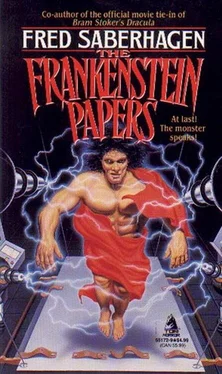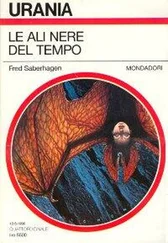Fred Saberhagen - The Frankenstein Papers
Здесь есть возможность читать онлайн «Fred Saberhagen - The Frankenstein Papers» весь текст электронной книги совершенно бесплатно (целиком полную версию без сокращений). В некоторых случаях можно слушать аудио, скачать через торрент в формате fb2 и присутствует краткое содержание. Год выпуска: 2011, Жанр: Старинная литература, на английском языке. Описание произведения, (предисловие) а так же отзывы посетителей доступны на портале библиотеки ЛибКат.
- Название:The Frankenstein Papers
- Автор:
- Жанр:
- Год:2011
- ISBN:нет данных
- Рейтинг книги:5 / 5. Голосов: 1
-
Избранное:Добавить в избранное
- Отзывы:
-
Ваша оценка:
- 100
- 1
- 2
- 3
- 4
- 5
The Frankenstein Papers: краткое содержание, описание и аннотация
Предлагаем к чтению аннотацию, описание, краткое содержание или предисловие (зависит от того, что написал сам автор книги «The Frankenstein Papers»). Если вы не нашли необходимую информацию о книге — напишите в комментариях, мы постараемся отыскать её.
The Frankenstein Papers — читать онлайн бесплатно полную книгу (весь текст) целиком
Ниже представлен текст книги, разбитый по страницам. Система сохранения места последней прочитанной страницы, позволяет с удобством читать онлайн бесплатно книгу «The Frankenstein Papers», без необходимости каждый раз заново искать на чём Вы остановились. Поставьте закладку, и сможете в любой момент перейти на страницу, на которой закончили чтение.
Интервал:
Закладка:
"I am a priest, my friend. It is my business to hear the nightmares of the troubled. I am only sorry that I cannot be of help, in return for all the help that you are giving me."
Father Jacques is now indeed weakening rapidly, under the stresses of the journey. I write more boldly now, in the growing belief that he will never read these words.
Today I raised aloud the possibility that we might turn back, and winter in his cabin, for I have begun to doubt that he will ever reach Montreal alive if we press on. But he refused at once, and to tell the truth I do not much like the idea myself, and did not press him on it. That he would survive the winter in the cabin, and be stronger in the spring, is to my mind doubtful also. Nor am I anxious to delay my own quest for almost a year.
Or am I? If I knew exactly what my quest is, I would doubtless refuse to delay it for even an hour. Is it vengeance that I seek, or only truth?
Or not even truth, perhaps, but only consolation.
September 26 —Today Father is no longer able to rise and walk. I carry him to the canoe, and paddle quickly south. Thick snow is already falling, and I want to get him as far as possible beyond the worst of the advancing winter. We rest tonight in a tiny shelter of pine boughs and logs, and I write in part because he has urged me to do so.
But I must keep writing. And set down what happened in London. And in the north of Scotland, when we attempted to revive the dead. But I cannot write of that tonight.
Chapter 6
September 28 _ My heart is heavy. My companion is dead .
It was a long and difficult dying, of more than four-and-twenty hours. When the breathing of Father Jacques became harsh and uneven, and he looked at me without recognition, I began to feel certain that the end was near. Yet life clung to him tenaciously. He sank by slow degrees into a stupor, then into total unconsciousness.
Only toward the end did the good priest rally briefly. Turning his eyes on me, he recognized me once more, and in a feeble voice gave me his blessing; he would have raised his hand, to sign me with the cross, but he could not. A minute later he had breathed his last.
To mark his passing, snow squalls churned their way across the Bay, while to the south, above both land and water, lightning and thunder wept and raged. There are times when I feel a kinship with these forces greater than with any man or woman. Is it perhaps because I know that these powers of the atmosphere assisted at my birth?
My friend's death has affected me, more than I had anticipated. I have tried to pray—but no. That is not strictly true. It would be more accurate to say that I wanted to make an attempt at prayer, but could not. In the end I heard myself muttering some foolish vow, based on no more than the sanctity of my own nature. A vow to do what? I do not even know that. I am not sure now where those words came from, or even what they meant. As I now remember and write down the fact, it appears incomprehensible; and yet at the moment it seemed to me that there was meaning in the words I muttered.
There is rock nearby, a rare sight along this low shore, and an outcrop shattered by weathering has afforded material for the mound under which my friend now lies buried—it is impossible, particularly without more tools than I possess, to dig in this frozen ground, and there are wolves. They are howling not very far outside the shelter as I write this, and I feel very much alone.
The lonely isles at the north of Scotland are not perpetually frozen, as most of this ground must be, but their soil is cold and very rocky. Still, in that soil we dug graves. It was the second grave for most who were put into the ground there, and the rude burial service—if it can be called a burial service; I do remember seeing Clerval's lips moving with muttered prayers—must have been the second for those poor dismembered beings also.
Not that there had been, between their burials, anything that could have been called a second life—but I am anticipating the order of my tale.
I must take great pains to make sure that it is all set down, as coherently as I can do so. Then if I do not survive, there will still be some hope that someone may read it one day and be warned.
Now, I have procrastinated quite long enough, and I must write of London. The Argo made port there in early February of 1780. with Robert Walton captain, and Roger Saville, her owner, on board along with Victor Frankenstein, Henry Clerval, and myself. We had sailed eagerly up the Thames, glad to be out of reach of the Channel storms that had tormented us, and arrived in sight of the metropolis at sunset.
At that time, judging by such of their conversations as I had been able to hear, my human masters (as they continued to believe themselves) still had not determined by what plan they should be most likely to profit from my existence. One of their problems in coming to an agreement among themselves was that their different natures compelled them to seek different goals. Saville craved power and wealth, even beyond the great amounts of each he had already. Walton wanted adventure, and, some day, fame. Clerval—I think he was one of those whose greatest desire is to know secrets that are denied to others. Also he was truly Victor's friend.
And as for my creator… but it is not so easy to set down the goals of Victor Frankenstein. He shared to some degree in the yearnings of each of the other men. And yet in his case there was something more.
However varied their final objectives might be, the four gentlemen had agreed, well before we reached London, that the next step in any successful plan must be for Victor to provide me with a mate. In some of their debates (to which I was a silent listener, more often than they knew) they even favored the scheme of supplying me with more than one female, for breeding purposes; the larger my harem, as Saville frequently remarked, the better the chance of quickly producing a population of willing slaves and workers.
Saville in particular was convinced that none of my progeny would, or could possibly, ever nurse any higher ambition than to serve in one of his burgeoning Birmingham factories, or perhaps labor on one of his Jamaican plantations—he owned several—under conditions where the blacks of Africa tended to die off unprofitably. He strove to implant this vision in the minds of Frankenstein and the others, and kept coming back again and again to the specification that all the workers ultimately produced must not only be docile, strong, and enduring, but should be able to subsist, like swine or goats, on acorns and other inexpensive roughage, with now and then a handful of berries as reward for some particularly difficult labor.
My own feelings were mixed as I listened to these discussions. Had I taken Saville's plans seriously, I would have been outraged. I realized he took such schemes very seriously indeed, and that the other men were at best indifferent to them, at worst his eager followers. But before any such design for breeding slaves could be put into effect, it was necessary that my mate, or mates, should be created. Somehow I could not, or did not wish to, look beyond that point. Let that be done, successfully, I thought. Let me be granted another like myself, mate and companion, and then we shall see what we shall see. Looking back now, I have a hard time understanding what my state of mind was then. But it was centered on an utter loneliness, an estrangement from the world, from which I have only lately started to emerge.
Clerval from the start took me more seriously than did any of the others, even my creator. To Henry it was never totally inconceivable that I might have some legitimate thoughts and aspirations of my own. In conferences with the other gentlemen he frequently expressed his opinion that they would be doing a great wrong in making me a slave, without first determining beyond doubt that my nature was fitted for nothing better. By raising this point he usually managed to awaken a twinge of conscience in Frankenstein, and got at least soothing agreement from the others. But then five minutes later the discussion would have returned to the question of whether plantations or mines would offer the most profitable use for my multitude of potential brothers, sisters, and descendants.
Читать дальшеИнтервал:
Закладка:
Похожие книги на «The Frankenstein Papers»
Представляем Вашему вниманию похожие книги на «The Frankenstein Papers» списком для выбора. Мы отобрали схожую по названию и смыслу литературу в надежде предоставить читателям больше вариантов отыскать новые, интересные, ещё непрочитанные произведения.
Обсуждение, отзывы о книге «The Frankenstein Papers» и просто собственные мнения читателей. Оставьте ваши комментарии, напишите, что Вы думаете о произведении, его смысле или главных героях. Укажите что конкретно понравилось, а что нет, и почему Вы так считаете.












